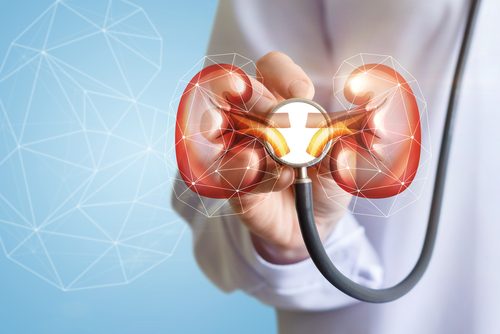When I wrote last week’s column about my dermatological issues caused by IBD, I wasn’t planning on discussing any other extraintestinal manifestations of IBD anytime soon. Then, last Thursday, I had my first appointment with a new nephrologist.
I had never had kidney issues until I experienced acute renal failure when my liver failed in 2017. With all the MRIs, ultrasounds, CT scans, and bloodwork to monitor my primary sclerosing cholangitis (PSC) and Crohn’s over the past two decades, not one of my doctors had ever voiced any concerns about my kidneys. It wasn’t until I was placed on dialysis to be “healthy” enough to receive a liver transplant that the nephrologist on my transplant team remarked that I most likely always had some sort of autoimmune kidney disease that had either gone undetected or undiagnosed.
The transplant team was able to save my kidneys, but they never fully recovered. My kidney functions are stable and teetering on the edge of what’s considered a normal range for my gender, race, and age. Unfortunately, my anti-rejection medication — Tacrolimus, which is also sometimes used to treat Crohn’s — is hard on my kidneys, and I wasn’t too surprised when my transplant hepatologist suggested I find a regular nephrologist to add to my mix of healthcare providers.
However, I was thrown for a loop when my new nephrologist, Dr. Ravi Mididoddi, said that 5-10% of people with IBD also suffer from kidney disorders, either as a complication of IBD or a side effect of the medications used to treat it. I guess my transplant nephrologist was right: An autoimmune disease was the culprit behind my renal problems. But I had no idea it might be Crohn’s.
When I told Dr. Mididoddi that I wrote this column, he was kind enough to share the results of a study published in the Clinical Journal of American Society of Nephrology in 2014 that concluded that “IBD is associated with a spectrum of kidney diseases most commonly affecting the glomerular and tubulointerstitial compartments.” As soon as I got home from my appointment with the journal article Dr. Mididoddi printed out for me, I began my own search for additional — and less technical — information on IBD and kidney disorders to educate myself before my next appointment with him in early June.
A brief fact sheet published by the Crohn’s & Colitis Foundation states, “Serious kidney complications associated with IBD are rare, but some less serious ones occur more frequently,” such as kidney stones. An article in the Journal of Crohn’s and Colitis summarizes several studies published between January 1998 and January 2015 and focuses on the types and causes of renal involvement found in Crohn’s and ulcerative colitis patients.
From these three resources and based on my history of Crohn’s and PSC, I’m betting that I have AA amyloidosis, which occurs as a reaction to chronic inflammatory diseases. Although the disease is rare, affecting only about 1 percent of Crohn’s patients, according to the Crohn’s & Colitis Foundation fact sheet, I wouldn’t be surprised if I fall into that category. As much as I know I shouldn’t self-diagnose, I enjoy solving puzzles, and with all my health issues, my body is one huge enigma.
AA amyloidosis is diagnosed by testing a 24-hour urine collection for protein, which my nephrologist has already ordered. The next step, if necessary, would be a renal biopsy. And so, I wait.
After years of one diagnosis after another, adding one more specialist to my growing list of doctors, and having another malady to monitor, I don’t know whether I’m apathetic or I’ve just learned not to worry until the doctor tells me to worry. Until June 6, all I can do is live the happiest and healthiest life possible. I’ll provide an update this summer and share more of what I learn about the connection between IBD and kidney disease.
***
Note: IBD News Today is strictly a news and information website about the disease. It does not provide medical advice, diagnosis, or treatment. This content is not intended to be a substitute for professional medical advice, diagnosis, or treatment. Always seek the advice of your physician or other qualified health providers with any questions you may have regarding a medical condition. Never disregard professional medical advice or delay in seeking it because of something you have read on this website. The opinions expressed in this column are not those of IBD News Today, or its parent company, BioNews Services, and are intended to spark discussion about issues pertaining to IBD.

